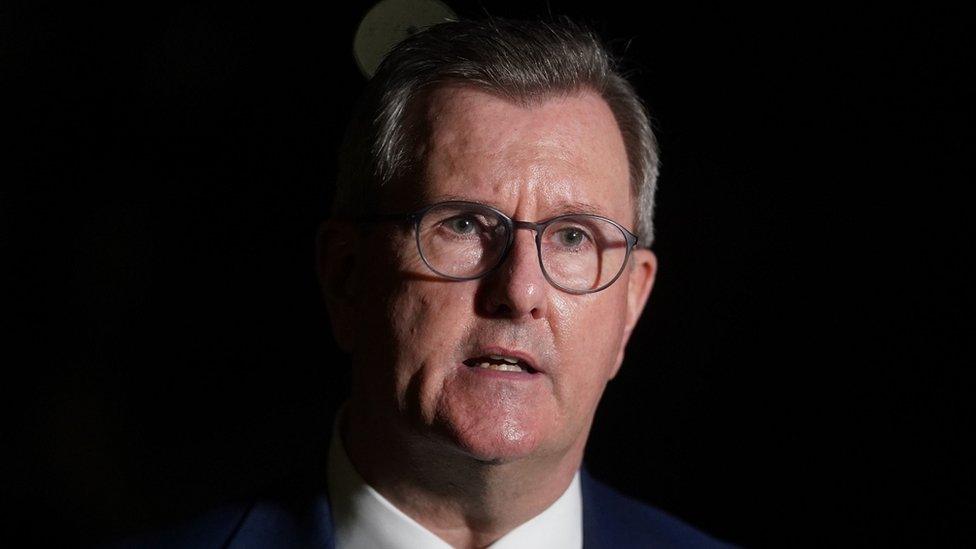DUP: No dissent within the party over Stormont boycott, says leader
- Published
- comments

Sir Jeffrey Donaldson says his party is "very clear and focussed on what we need to achieve"
There is "absolutely no dissent" within the Democratic Unionist Party (DUP) about its boycott of Stormont and its strategy on the Windsor Framework, Sir Jeffrey Donaldson has said.
The party leader insisted there was a "strong, united approach".
He was speaking after the party's 130-strong ruling executive met in Lurgan, County Armagh, on Thursday night.
The DUP has been boycotting Stormont since February 2022 in protest against post-Brexit trade arrangements.
That has left Northern Ireland without a functioning government for 20 months, a problem exacerbated by a major budgetary crisis facing public services.
For months rival political parties have been urging the DUP end its stand-off, with Sinn Fein - the biggest party at Stormont - saying there is "no excuse" for it to continue.
But the DUP is refusing to return until Prime Minister Rishi Sunak addresses its concerns about the Windsor Framework, which sets out new trade rules for Northern Ireland.
Sir Jeffrey updated his party's MPs, MLAs and grassroots constituency members on how his negotiations with the UK government were going.
"In terms of taking soundings, I talk to my party all the time," he said after Thursday's meeting with DUP members.
"I hold townhall meetings with people. I listen to what people have to say and our concerns.
"Indeed many of those who have concerns are at the heart of the proposals we have put to the government."
He insisted that no recommendations had been put to the party on Thursday night as he is waiting on "final proposals" from Number 10.
"We're waiting for the government to come back now with the latest set of proposals," he said.
"We'll keep working at this. It would be great to see an outcome that works for Northern Ireland.
"We know that the government are in a position to respond to our latest proposals we expect that may come in the next couple of weeks."
Window of opportunity?
Speaking on Friday morning, Taoiseach (Irish Prime Minister) Leo Varadkar said there was chance to restore power-sharing at Stormont, having been briefed by Mr Sunak about the talks.
"Perhaps this is another window of opportunity to come to an agreement between the UK government and the DUP," said Mr Varadkar.
"Hopefully that's the case but that remains to be seen over the next days."


The UK government is due to respond to the DUP's latest concerns about the Windsor Framework early next week.
It will allow Sir Jeffrey Donaldson and his party some time to chew over what will be in that correspondence.
The party leader will then address his members at the DUP conference - Number 10 will have a keen ear on what he has to say about the proposals.
The last two weeks of October and the early days of November will be a critical period of time that could determine whether the DUP finally ends its lengthy boycott.

The pressure on the DUP to end its boycott increasing week by week, with the boss of the Belfast shipyard Harland and Wolff the latest to outline his concerns about the lack of devolved government.
Chief executive John Wood warned that the stalemate was putting future investment at the shipyard in jeopardy and said that increasing his workforce would be "problematic" without a functioning executive at Stormont.
A US trade delegation is due to visit Northern Ireland this month, led by US Special Envoy Joe Kennedy, and it is expected that they will discuss the Stormont crisis with politicians.
What effect is the crisis having on everyday life?
Over the past year the political quagmire and cuts to public services have affected many aspects of life in Northern Ireland.
A funding shortfall for the Department of Education has led to the end of schemes for disadvantaged children and has even left Northern Ireland's libraries without enough money to buy new books.
An independent report recently warned that "short-sighted cuts" risked creating longer-term problems for children, which would increase demand for public services in the future.
Northern Ireland's hospital waiting lists are the worst in the UK, while cuts to funding have left charities and voluntary groups that provide frontline health services "on the brink of collapse".
Northern Ireland's police service has complained of a £141m shortfall in its budget, forcing it to cut its number of officers and consider closing some of its stations.
Road repairs could be drastically reduced and street lights switched off by the Department for Infrastructure as it tries to make savings.
Reducing social housing targets and offers of employment support are among plans for reducing overspend in other departments.